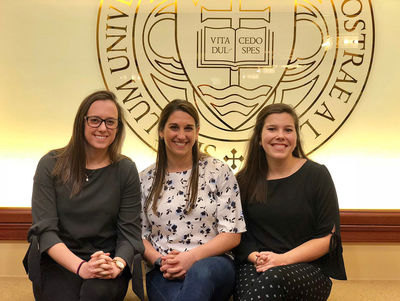 (L-R) Mikaela Saugstad, Emily Russo, and Marissa Koscielski
(L-R) Mikaela Saugstad, Emily Russo, and Marissa Koscielski
For Mikaela Saugstad, a team project for her master’s degree project at the University of Notre Dame wasn’t just about a grade; it was a chance to use her own struggles to help others.
Diagnosed with rheumatoid arthritis, Saugstad has had to self-administer medication through an injection once a week since the age of 15. Her fear of needles has made this a struggle for her and her parents.
Saugstad, along with classmates and roommates Emily Russo and Marissa Koscielski, are co-founders of Gigil, a new startup at the IDEA Center at Notre Dame that is developing a medical device to assist patients who administer self-injections of medicine at home.
The idea for Gigil started while the three women, all students of Notre Dame’s Engineering, Science & Technology Entrepreneurship Excellence Masters Program (ESTEEM), were brainstorming project ideas. Saugstad mentioned the problems surrounding her weekly injections and soon the team was developing ideas for devices that would be easier to use than standard syringes.
“I wanted to make the process easier for other pediatric patients down the road who are diagnosed with similar diseases and need injections as treatment,” said Saugstad.
Eager to bring the idea to life, the women started drawing concepts. Saugstad demonstrated the exact angle a needle needs to take as it enters the skin as well as the proper depth. The three then began to think of ways to create a device that could easily ensure both of these criteria were met, building handcrafted models and experimenting with 3D printing.
To speed up the process, the team hired an engineering classmate to develop a more workable prototype that Saugstad could comfortably use for her own injections.
The name Gigil, which means “an extreme urge to squeeze something cute,” is Filipino. Koscielski came across the word when she was looking up words in different languages and trying to find something spiritual and meaningful.
“We think the term really fits our initial pediatric target market as well as the process of pinching and squeezing your skin to help inject,” said Russo.
The Gigil team has registered as a Limited Liability Company (LLC) and submitted a provisional patent with the help of the Intellectual Property and Entrepreneurship Clinic at Notre Dame. The team aims to file a formal utility patent in the spring. In addition, the team is set to kick off FDA certification filing this month, an essential step to bringing their medical device into the market.
Gigil’s device has received positive feedback from doctors, nurses, and patients who routinely self-administer medication. It hasn’t, however, been used on actual patients yet, as that requires FDA approval.
Currently focusing on a single product, the team expects to launch additional devices customized for different levels of injections or products in different sizes for kids and adults next.
A house of collaboration
Living under the same roof, the three women work together on almost everything, ranging from product design to idea validation to document filing.
“We are definitely super collaborative,” said Russo. “If we have any idea, we are very honest with feedback on whether it works or not. It’s a blessing to be able to start a business together and know each other well, giving feedback and nailing down the process.”
When a group member comes up with a new idea, the group will take it on board, draw it out and try it. “If it doesn’t work, we pivot and keep going,” said Koscielski.
The girls said they felt empowered through their joint efforts and were committed to driving female entrepreneurship as a whole.
“We are all very motivated and goal-oriented. We are females and we are out to prove ourselves,” said Saugstad.
“I love women empowerment,” Koscielski added.
In addition to their engineering teammate, the Gigil team has expanded to recruit financial and legal professionals in a bid to build a solid business plan for Notre Dame’s 2018 McCloskey New Venture Competition in April, and to figure out an effective go-to-market strategy.